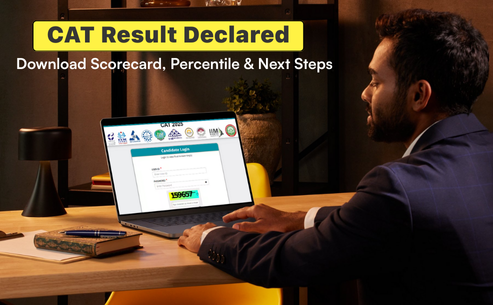Aspirants, prepare for your CAT Personal interview with confidence. Discover preparation tips, mock tests, and expert advice to face the panel. Elevate your interview skills today with Tarkashastra.
“Tarkashastra made my MBA CET registration seamless with their guidance and resources at every step.”
Join our classes today.
Add Your Heading Text Here
Mastering the CAT Interview Journey
Navigating the road to an MBA often feels like conquering a demanding marathon. The CAT personal interview stands out as a defining moment among the essential hurdles. This stage is not just a test of academic prowess; it’s a window to showcase your communication skills, personality, and overall fit for a management program.
Our comprehensive guide is designed to equip CAT aspirants, MBA applicants, and interview preparation seekers with the tools needed to excel in this critical phase.
Dive into our insights, strategies, and expert tips. From understanding what makes CAT interviews unique to demystifying mock tests and facing the interview panel with confidence, we’re here to guide you every step of the way.
What is a CAT Personal Interview?
In the context of CAT admissions, a Personal Interview involves a real-time, one-on-one interaction between an interviewee and a group of personnel referred to as interviewers. The CAT Personal Interview is a critical tool institutes utilise to assess an individual’s capabilities during the admissions process. During a personal interview, the interviewer or panel meticulously observes the candidate’s verbal responses and implied behavior.
What is asked in the PI?
Interviewers seek to understand all aspects of the interviewee. During a personal interview, expect questions about your personality, work style, experience, psychological approach, and work interests. Always highlight the positive aspects, even when faced with challenging questions. While some queries may not have definitive right or wrong answers, ensure your responses are specific and assertive.
Key Points for CAT 2023 Personal Interview
- Don’t speak on topics you’re unfamiliar with
- Stick to actual algorithms; don’t bluff
- Show the presence of mind
- Avoid slang/jargon
- Dress formally
- Be prepared
CAT Personal Interview Preparation
Preparing for a CAT interview may seem daunting, but you can enhance your chances of success with the right approach. Adhering to these guidelines will increase your likelihood of excelling in your CAT 2024 interview and securing your desired program. Here are some practical tips to assist you in your preparation:
- Understand Your Program and Institute: Research the program and institute before the interview. Familiarise yourself with their mission, values, and recent accomplishments. This knowledge will demonstrate your genuine interest.
- Stay Informed on Current Affairs: Candidates should stay abreast of current affairs. This will enable you to address questions related to current events with confidence.
- Conduct a Self-Assessment: Reflect on yourself to identify your strengths and weaknesses. Recognizing areas for improvement is a step towards building self-confidence.
- Engage in Mock Interviews: Practice is key! Conduct mock interviews to become comfortable with the interview process. This also helps you identify areas for improvement.
- Prepare for Common Questions: Rehearse answers to common interview questions such as “Tell us about yourself” and “What are your strengths and weaknesses?” This ensures you are prepared for fundamental inquiries.
- Exclude Confidence and Authenticity: During the interview, be yourself. Display confidence and honesty, allowing your passion and interest to shine through. Authenticity is crucial.
- Pay Attention to Body Language: Maintain eye contact and offer a firm handshake. These gestures convey confidence and professionalism.
- Remain Calm and Focused: Avoid fidgeting or adjusting your hair, as such behaviours can detract from your professionalism and concentration.
- Dress Appropriately: Dress professionally and neatly for the interview. Your attire should reflect your commitment to the opportunity.
- Know the Basic Etiquettes: Lastly, familiarise yourself with basic interview etiquette. This includes arriving early, switching off your phone during the interview and following up with a thank-you note post-interview.
Keep following Tarkashastra YouTube channel for more such timely and constructive tips from our successful students.
How to handle disagreements during a CAT group discussion?
Managing disagreements in a CAT group discussion can be challenging. Still, effective strategies exist to manage conflicts and differences of opinion during a GD. By using these techniques, you will be better prepared to address disagreements effectively, demonstrating your collaborative and harmonious working abilities.
Here are some professional tips for handling disagreements:
- Listen Actively: Pay close attention to what other participants express. Actively listening to their views and opinions aids in understanding their perspective.
- Stay Composed: It is critical to remain calm and composed, even when differing in opinions with others. Maintaining your composure reflects maturity and professionalism.
- Avoid Interruptions: Patience is essential. Refrain from interrupting others, allowing them to fully express their thoughts before sharing your own.
- Respect Differences: Respect fellow participants’ opinions, even if you strongly disagree. Everyone is entitled to their viewpoint.
- Seek Common Ground: Identify areas of agreement or common ground. Building on shared ideas can help bridge differences.
- Consider Compromise: At times, finding a middle ground is beneficial. Be open to compromise to reach solutions that partially satisfy everyone’s needs.
- Seek Mediation: If a disagreement persists and becomes unproductive, consider seeking assistance from the moderator or facilitator. They can help resolve the issue.
Top Do's and Don'ts Tips for CAT Interview
Do’s:
- Thorough Preparation: Research the program, institute, and current affairs.
- Mock Interviews Practice: Be prepared to discuss your resume, experiences, and motivations.
- Maintain Confidence: Exhibit positive body language and make eye contact.
- Honest Responses: Be genuine and truthful in your answers.
- Highlight Strengths: Emphasise your strengths and their relevance to the MBA program.
Don’ts:
- Avoid Overloading: Do not include unnecessary details in your answers.
- Stay Positive: Avoid highlighting weaknesses critical to the program.
- Steer Clear of Clichés: Avoid generic statements and responses.
- Refrain from Guessing: Admit if you don’t know an answer rather than guessing.
- Keep Answers Concise: Ensure your answers are concise and relevant to the question posed.
Common Questions for the CAT Personal Interview
In the CAT personal interview, candidates are typically queried on their academic background, work experience (if applicable), motivations for pursuing an MBA, strengths and weaknesses, leadership capabilities, problem-solving skills, future objectives, and potential contributions to the MBA program and the business world. Interviewers may also explore current affairs and industry trends and pose situational questions to evaluate the candidate’s analytical thinking and decision-making abilities.
Common questions asked during the CAT Interview include:
Tell me about yourself.
This question is frequently used to evaluate your communication abilities. It offers an opportunity to concisely overview your background, accomplishments, and interests.
Why do you want to join this management program?
Interviewers seek to assess your motivation and comprehension of their institution. Ensure you are prepared to articulate specific program elements that appeal to you.
What are your strengths and weaknesses?
This question evaluates your self-awareness and capacity for reflecting on your personal and professional qualities. When addressing weaknesses, emphasise the steps you’ve taken to enhance them.
Describe a challenging situation you’ve faced and how you handled it.
Interviewers pose this question to assess your problem-solving abilities, resilience, and capacity to manage adversity. Employ the STAR method (Situation, Task, Action, Result) to structure your response effectively.
Where do you see yourself after pursuing this course?
This question seeks to explore your career goals and aspirations. Exhibit ambition while illustrating how the management program aligns with your future plans.
How do you handle teamwork and conflict?
Please elaborate on your experience with team collaboration and constructive conflict resolution for this question.
What skills and qualities do you possess that make you a strong candidate for this program?
To address this, emphasise pertinent skills, experiences, and personal qualities that align with the program’s requirements and enhance its academic and social environment.
Conclusion
Mastering the CAT interview process combines preparation, self-awareness, and adaptability. Armed with the strategies outlined in this guide, you’re well-equipped to tackle this critical phase of your MBA application. Remember, interviews are not just about impressing the panel but also about finding the right fit for your future.
Ready to take the next step? Explore our resources, connect with mentors at Tarkashastra, and access mock tests to hone your skills. With dedication and perseverance, you’re on your way to securing your spot in your dream MBA program.
FAQs
-
1. What is the importance of CAT interviews in the selection process?
CAT interviews are critical in assessing a candidate's readiness for a management program. They evaluate communication skills, problem-solving capabilities, motivations for an MBA, and how well the candidate's aspirations align with the program's goals.
-
2. How should I prepare for CAT interviews?
Preparation should include thoroughly researching the program and institution, practising mock interviews, staying informed about current affairs, and honing your communication and presentation skills.
-
3. What types of questions are typically asked in a CAT interview?
Questions often cover your academic background, work experience, strengths and weaknesses, leadership and teamwork experiences, career aspirations, and understanding of current business trends.
-
4. How important are mock interviews in CAT interview preparation?
Mock interviews are vital as they help simulate the interview environment, allowing you to practice your responses, receive feedback, and improve your performance under pressure.
-
5. What are the best tips for facing the interview panel?
Maintain confidence with positive body language and eye contact, be genuine in your responses, listen carefully to the questions, and ensure your answers are concise and relevant.
-
6. How should I handle difficult or unexpected questions in a CAT interview?
Remain calm and take a moment to gather your thoughts. It's better to convey honesty if you're unsure rather than speculating. Use logical reasoning and examples wherever possible.
-
7. What are the common mistakes to avoid in a CAT interview?
Avoid overloading your answers with unnecessary details, guessing answers if unsure, using clichés, and presenting generic, unrehearsed statements. Always stay positive and focused.
-
8. How can I improve my communication skills for CAT interviews?
Practise speaking clearly and confidently, participate in debate clubs or public speaking forums, read extensively to expand vocabulary, and engage in group discussions to hone articulation.
-
9. What should I wear for a CAT interview?
Dress in professional attire that is neat, clean, and appropriate for a business setting. Consider the organisation’s culture but always prioritise formality over casualness.
-
10. How much time should I spend preparing for CAT interviews?
Preparation time varies by individual, but starting at least a month in advance allows for thorough research, practice, and reflection on your experiences and goals.
-
11. What role does body language play in a CAT interview?
Body language conveys confidence and professionalism. Maintaining good posture, making appropriate eye contact, and avoiding restless movements are key to leaving a positive impression.
-
12. How do I stay updated with current affairs for the CAT interview?
Regularly read reputable news sources, watch business news channels, subscribe to podcasts, and discuss current events with peers to keep informed.
-
13. What should I highlight about my academic or work background during the CAT interview?
Focus on experiences that demonstrate your skills, achievements, and growth. Highlight leadership roles, problem-solving situations, and your unique contributions to past projects.







